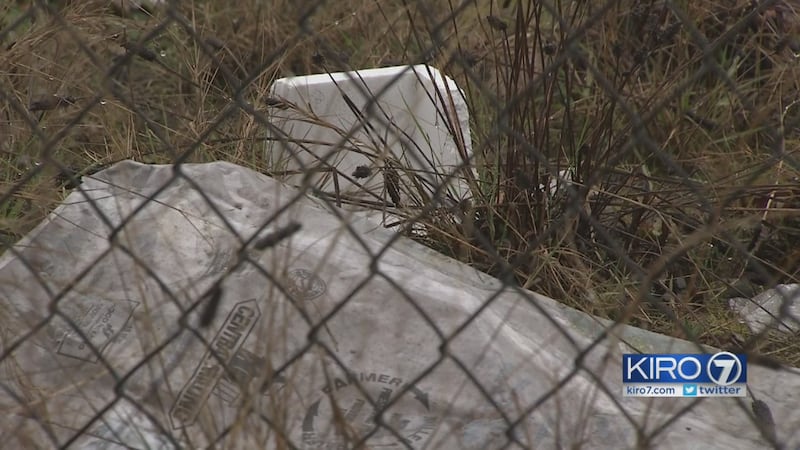More litter borders our state's busiest freeways than ever before, and people complain about litter more than anything else, according to the Washington State Department of Transportation.
KIRO 7 has learned, WSDOT is no longer getting cleanup help from a source it's relied on for nearly two decades; prison inmates.
On a recent weekday, drivers complained about the amount of trash along state roads. While driving northbound on I-5, Janet Widener of Grays Harbor County told KIRO 7, “it’s just so much worse to me, it’s bad.”
Her husband, Kenneth Wideneer said “Me and the wife, we talk about it all the time when we come up the road, how bad it’s getting.”
Elizabeth Stierle of Castle Rock said she noticed the most trash along I-5 “going through Seattle.”
“The highway looks terrible,” Armando Gonzalez of Federal Way said.
“It looks bad. People throw trash, throw everything. It’s not good."
Along state highways -- especially on I-5 from Everett to Olympia -- litter is worse now than it has ever been and drivers aren't the only ones noticing.
“It seems to be a growing issue,” acknowledged Rico Baroga, Maintenance Policy Manager for the Washington State Department of Transportation.
Baroga explained that drivers notice litter more in winter because vegetation is scarce, but he said there’s also more trash because fewer volunteers cleanup during harsh weather.
Another reason, according to Baroga, is our state's growing population.
"It’s been a gradual increase in litter, and I think it mirrors the overall growth in traffic, the growth of our state,” Baroga said.
Washington now has more than 7.3 million residents.
The population grew 14 percent between the years 2000 and 2010, and is growing by another 2 percent each year in King, Pierce and Snohomish counties where freeway traffic -- and litter -- are the worst, according to Baroga.
Another reason drivers are seeing more highway litter -- for the first time in nearly 20-years, statewide cleanup help is not being provided by paid prison inmates and those on community supervision.
The partnership between the DOT and the Washington State Department of Corrections was put on hold last August because of concerns over how pending legislation in Olympia will impact liability.
Without a resolution to House Bill 1227, it's not clear which agency would be responsible if something went wrong.
"Much of the work that inmates focus on is helping us clean up homeless encampments," WSDOT's Maintenance Operations Manager James Morin told KIRO 7.
"Currently, we have an issue with the agreement we have between the two agencies," Morin said, "so right now, we're not using the DOC crews."
In 2016, DOC work crews removed 143,740 pounds of litter and illegal dumping at encampments in King County alone, according to DOC Communications Director Jeremy Barclay.
However, those crews haven't been on the job --- anywhere in the state --- for the past six months.
"They do great work," Morin told KIRO 7.
He said the DOC inmates are "very motivated as a group."
The Washington State Department of Transportation budgets at least $4 million gas-tax dollars a year for litter cleanup; a cost that is slowly escalating for a problem that is mostly preventable, according to Morin and Baroga.
“It’s frustrating,” Baroga told KIRO 7. “There are a lot of other higher priorities, safety-related issues, mobility-related issues that we would rather invest in and spend the money on,” instead of litter pick-up, he said.
DOT gave KIRO 7 News this comment on the clean-up stalemate:
"We continue to work on the DOC contract negotiations, but we need to resolve some outstanding issues, including who is considered the employer of these workers for L&I liability purposes.
There is no concern about costs or making payments, but rather the risk of assuming employer status of the workers. In addition, we also are monitoring the pending legislation that may affect this contract to ensure any decisions are aligned with potential new law," wrote Barbara LaBoe with
WSDOT communications.
"We have a contract in place, but have paused activity while we re-negotiate the liability and risk issues. No contract has been terminated, but some work orders – agreements for specific regions rather than the overall agency contract – were not renewed due to ongoing negotiations. Our goal is continue to use these work crews as soon as we can resolve the liability questions.
DOC gave KIRO 7 News this comment on the clean-up stalemate:
- There has been an ongoing contract in place since at least August of 2000.
- In partnership with the Washington Department of Transportation (DOT), the Washington Department of Corrections, through community work crews, removed 143,740 pounds of litter and illegal dumping at encampments located in King County during calendar year 2016.
- The work equates to community supervised individuals providing over 1,642 hours of community restitution in lieu of jail time (equivalent to $15,546 of labor, using minimum wage). The accomplished work is community service in correlation with a court-agreement for restitution.
- The most recent work was accomplished in August and there are no pending work orders.
- The Departments of Transportation and Corrections have maintained a work crew contract between the two parties since at least summer of 2000. The contract between the DOT and Corrections remains in effect.
- The departments await the outcome of HB 1227 prior to moving forward with any potential new work orders.
- The two state departments continue to be supportive of the mutually beneficial work projects accomplished through their partnership.
For information on the Ecology Youth Corps, click here.
For information on how you can Adopt A Highway, click here.
Cox Media Group








